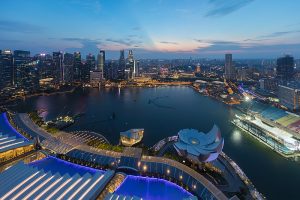Singapore’s Deputy Prime Minister Heng Swee Keat recently stated that Singapore needs to hold its general election as soon as possible. “The sooner we get it done, the earlier we can rally everybody together” to deal with COVID-19, the city-state’s The Straits Times reports.
Such statements are not uncommon from members of the ruling People’s Action Party (PAP), which has ruled the island nation since independence in 1965. As Singapore was battling the pandemic, Ong Ye Kung, the minister of education, stated in an interview: “I think we just have to accept that COVID-19 will be with us for quite some months, and we just have to ensure that life can go on, and that democracy can go on.” The interview was published on April 8, when there were only 142 COVID-19 cases in Singapore.
According to Article 65 of Singapore’s constitution, the president may at any time, when advised by the prime minister, dissolve parliament and call for a general election. An election is to be held within five years of the first sitting of the current parliament. The next election is to be held no later than April 14, 2021.
Initially, Singapore’s method of handling the virus was praised and lauded as a global standard. Contact tracing apps, mass screenings, and swift isolation were all elements of Singapore’s initial success story. But by the middle of April the number of COVID-19 cases spiked, with a jump to 1,426 cases on April 20 followed by a consistent stretch of more than 500 cases per day until May 2 and picking up again. As of June 4, Singapore has recorded a total of 36,405 cases. What went wrong?
The mistake lay in the government’s lack of oversight on migrant workers living in cramped dormitories. Their close proximity and poor living conditions contributed to Singapore’s “reservoir” of new COVID-19 cases. Despite calls from local NGOs highlighting the poor treatment of migrant workers, the government had done little to act. According to the Singapore Ministry of Health, these migrant workers have contributed to 90 percent of the city-state’s COVID-19 cases. Singapore has remained heavily reliant on migrant workers for construction labor and as Singapore continues to seek rapid development, this dependency will not go away anytime soon.
As the rising number of cases shook the nation, talk of a general election began to subside. At first, the government was confident in its methods of handling the virus and saw it as an opportunity to secure a stronger mandate. But as the case numbers rose and Singaporean citizens began questioning the effectiveness of the government’s methods – or lack thereof – the government proceeded to push for a patriotic campaign of “SG United,” staging national “sing-alongs” and encouraging displays of the national flag. During such difficult times, such calls for national unity are necessary to bring people together; yet, it cannot be denied that such campaigns strengthen the government’s image and improve relations between the PAP and the electorate.
The PAP has ruled Singapore since independence. Formidable attempts throughout the decades by opposition politicians have suffered great setbacks. The PAP has historically sought to weaken political opposition through lawsuits; such was the case against the Singapore Democratic Party’s Chee Soon Juan, who was sued into bankruptcy. The former chief of the Workers Party, another opposition party that currently holds nine out of 105 seats, once quipped that the Singapore government has the tendency to “sue until your pants drop!”
The major issue that the Singaporean political opposition faces is immense division. Up against the monolith of the PAP are 12 active parties, all with their own agendas and personalities. Former PAP member of parliament, Dr. Tan Cheng Bock, went ahead to create his own party, the Progress Singapore Party (PSP), giving hope that the opposition might have a new figure to lead the charge. But even before contesting its first elections, two prominent members of the party left and proceeded to form their own party, named Red Dot United, bringing into further question the sustainability of opposition unity.
According to Freedom House’s country report for 2020, Singapore scored 19 out of 40 in political rights and 31 out of 60 in civil liberties, making it “partly free” in the NGO’s rankings. In such a political climate, criticism of the government and freedom of speech remain limited and the media remains heavily regulated.
In 2019 the government adopted the Protection against Online Falsehoods and Manipulation Act (POFMA), which essentially gave government ministers the power to determine what content is false and to order removals and correction notices. That power has been used several times against independent journalists and the political opposition. The government has justified this law and its actions as necessary to protect the stability of the country against falsehoods and malicious influences, but Singaporeans are well aware of who is to decide whether the cup is half full or half empty.
The PAP, the state, and Singapore itself have become greatly intertwined. It is no surprise as to why the party has won every election since independence. However, the pandemic has revealed the limits of the one-party state. Singaporeans have criticized the government’s handling of the crisis; in hindsight, civil society had raised the issues and difficulties migrant workers faced, but – as is characteristic of complacent government – nothing was done. Singapore has suffered for this inaction, but it is fair to ask: would Singapore’s fractured opposition do any better? The Singaporean people are left to decide in the coming election between political fracture or inactive complacency.
Nigel Li is a contributing writer for the Taipei Times and is currently studying at the Moscow State Institute of International Relations.

































